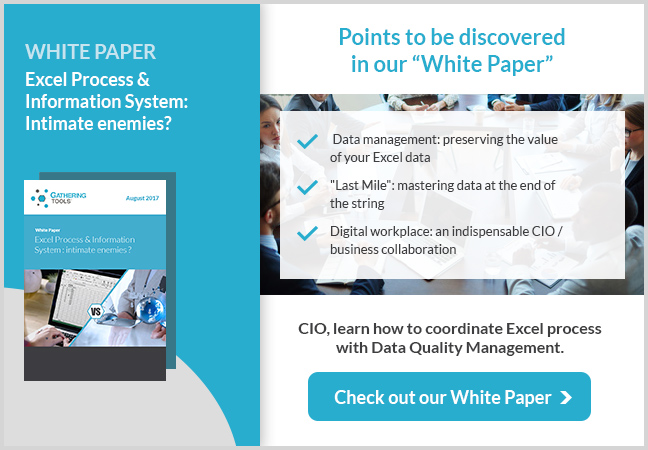The data is now the keystone of the company. No decision is made without a good analysis of indicators constructed from multiple sources. Among these sources, Excel spreadsheets occupy a special place. How do you oversee all these files that are beyond the control of CIO at the time of data governance? Should they be replaced? Should users be forced to use applications connected to the Information System?
And if finally, the answer was simpler than you could imagine …
The strong presence of Excel in the businesses
 Our dear spreadsheets are present everywhere: in the marketing department, finance department, sales department, production department, and the list will never end. Everyone has used Excel one day, and a lot of people do use it every day. Excel files can be opened in almost all the countries of the planet and it is one of the only applications in which one can open a file dating from 1987. We all must be clear on one point, that Excel has no equal in terms of interoperability: the ability of a system to work with parts of another system
Our dear spreadsheets are present everywhere: in the marketing department, finance department, sales department, production department, and the list will never end. Everyone has used Excel one day, and a lot of people do use it every day. Excel files can be opened in almost all the countries of the planet and it is one of the only applications in which one can open a file dating from 1987. We all must be clear on one point, that Excel has no equal in terms of interoperability: the ability of a system to work with parts of another system
The ‘Swiss knife’ like a side of Excel makes it an ally for many employees. For example, an ERP is often perceived as rigid; whereas, the flexibility and speed of Excel, appear to the users as a space of freedom without constraint, that saves considerable time. Indeed, with CIOs facing increasingly constrained budgets and projects with shorter deadlines, everyone has learned to fend for themselves.
All departments enrich their workbooks with complex formulas. Every owner of Excel file is proud of his little jewel built during his years of work. So beware CIO, because it is out of the question to put them in the dustbins!
It is impossible to make it a “Tabula Rasa”
 Sometimes as a CIO, you might want to get rid of all these files, and you are the very aware more than anyone else: it’s impossible. You would attract the resentfulness of all the daily users of Excel. Managing your business in this way would be difficult to sustain good conditions. Do not bother to stretch the stick to get beaten. Then, even if in terms of data governance, Excel is far from being an ideal solution, it is very often the only tool available for all businesses, it is a kind of common good and almost a cultural phenomenon! For example, TMS software does not give them the flexibility need buy Group Treasurers, so they are obliged to use it in addition to the Excel processes (see our article “Treasury forecasts: the panorama of practices”).
Sometimes as a CIO, you might want to get rid of all these files, and you are the very aware more than anyone else: it’s impossible. You would attract the resentfulness of all the daily users of Excel. Managing your business in this way would be difficult to sustain good conditions. Do not bother to stretch the stick to get beaten. Then, even if in terms of data governance, Excel is far from being an ideal solution, it is very often the only tool available for all businesses, it is a kind of common good and almost a cultural phenomenon! For example, TMS software does not give them the flexibility need buy Group Treasurers, so they are obliged to use it in addition to the Excel processes (see our article “Treasury forecasts: the panorama of practices”).
Moreover, even if many files are poorly constructed and contain errors, let us not forget the few pearls encountered here and there. Excel workbooks with high added value, which concentrates a real expertise, at the business level, is much better to keep, rather than trying to replace them with another tool. So how to link the data governance requirements and the “main” Excel workbooks?
The reconciliation of the irreconcilable?
A solution exists to give Excel users the “right way” of data management, and especially to help them to make a reliable construction of their KPIs. This will also allow you to integrate some of the shadow IT data into your Information System, and thus strengthening your data governance policy. This solution is called Gathering Tools, and it will soon become your best partner to carry out your data urbanization strategy. Thanks to its capabilities, you will be able to drastically limit the wicked effects of Excel, and retain only its virtues and its spirit.
 No more unnecessary macros and versioning problems. For example, the owner of the file and/or you will be able to lock the critical fields and leave “free” only the cells to be filled. With Gathering Tools the management of multiple versions of Excel files will only become not more than a bad memory. The user is able to know how many versions have been sent, by whom and when.
No more unnecessary macros and versioning problems. For example, the owner of the file and/or you will be able to lock the critical fields and leave “free” only the cells to be filled. With Gathering Tools the management of multiple versions of Excel files will only become not more than a bad memory. The user is able to know how many versions have been sent, by whom and when.
And this is just a snapshot … Find out in detail how Gathering Tools can help you link Excel and Data Governance





